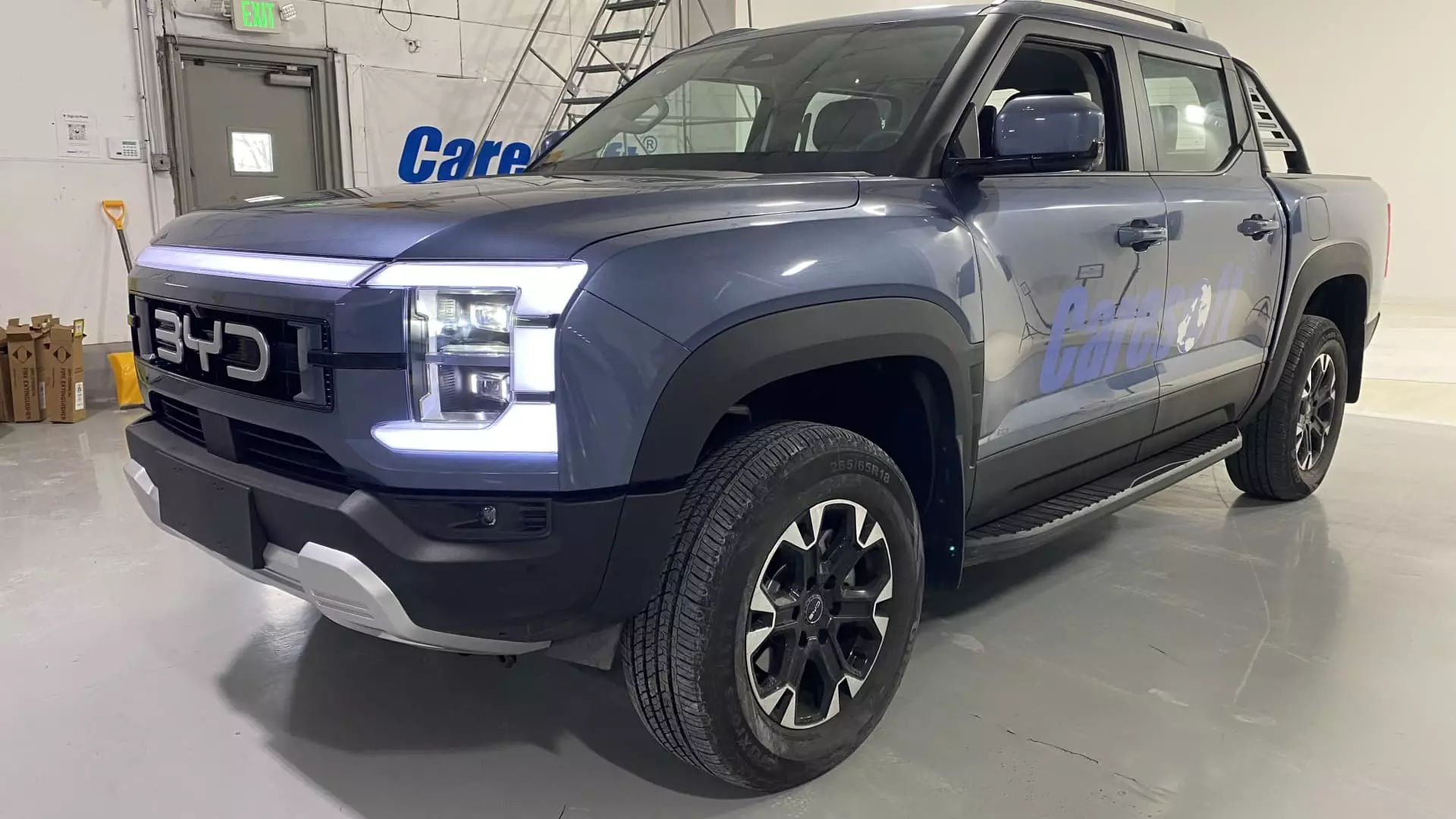In recent years, the automotive industry has witnessed a transformative shift with the emergence of Chinese manufacturers, particularly BYD Auto. Entering the market with innovative vehicle designs and competitive pricing, BYD is grabbing significant attention from traditional automakers. Recently, the company has unveiled the BYD Shark, a midsize pickup that strategically targets markets where established brands like Ford and Toyota dominate. This new entrant embodies a clever fusion of familiarity and innovation, prompting automakers to reconsider their strategies amidst a rapidly evolving landscape.
The BYD Shark shows a striking resemblance to popular American models such as the Ford F-150 and Explorer, suggesting that it could comfortably blend into the American automotive scene. Though BYD has yet to announce intentions to bring the Shark to the U.S. market, it is already making strides in regions where these American giants operate, such as Australia, Brazil, and Mexico. This indicates BYD’s readiness to challenge the monopolistic hold of American manufacturers on pickup truck sales in these crucial markets.
The automotive ecosystem in the United States largely hinges on pickup truck sales, which account for substantial revenue for manufacturers, particularly Ford and General Motors. In this context, the BYD Shark stands as a potential disruptor. Reports suggest that Chinese automakers could flood international markets with competitively priced models, raising concerns among American manufacturers about sustaining their market shares.
Industry experts, including Terry Woychowski from Caresoft Global, have noted the financial importance of trucks for automakers. With such vehicles comprising a significant portion of annual sales, the entry of Chinese brands like BYD instigates a critical dialogue: can traditional players maintain their footing as new contenders emerge?
The Allure of Competitive Pricing
Pricing plays an instrumental role in the success of the BYD Shark. Starting at approximately $44,000 in Mexico, the Shark is positioned as an appealing alternative to both midrange models like the Ford Ranger and Toyota Tacoma and more premium options available in the U.S. market. This pricing strategy not only makes the Shark accessible but also poses a pricing challenge for other manufacturers aiming to retain their market share in various regions.
Moreover, the BYD Shark combines a hybrid engine with electric vehicle technology, offering flexibility in energy consumption. It boasts an impressive combined range of over 500 miles, allowing consumers the option of using both electric and gasoline power. Such innovation could resonate well with environmentally conscious buyers while also appealing to traditional truck enthusiasts.
Performance and Design Assessment
Initial impressions of the BYD Shark’s performance reveal a promising, yet uneven, execution. Testing the vehicle on varied terrains, observers noted commendable acceleration and a quiet ride. However, comparison to competitors such as the Tesla Cybertruck or GM’s electric offerings highlighted areas for improvement in ride refinement.
Woychowski’s analysis pointed to several design quirks, including underwhelming storage options due to battery placement and a peculiar back seat fold mechanism. Despite these concerns, the overall build quality reflects the rigorous standards required by the market, suggesting that the Shark is a credible competitor.
What stands out is the Shark’s unconventional approach to construction. Features like dual control arms in the rear suspension and wax-dipped frames echo techniques long utilized by American counterparts, emphasizing BYD’s strategy of learning from the established market leaders.
With BYD reportedly exporting more than 10,000 Sharks in a single year, the momentum behind this vehicle indicates a shift that could alter the competitive landscape significantly. Analysts predict continued growth for BYD, with estimates suggesting an increase in global vehicle sales to approximately 5.5 million units by the end of the year.
As the company plans to expand its production capabilities, it may further challenge established brands, prompting them to innovate or risk losing market relevance. Toyota’s Chairman, Akio Toyoda, has already acknowledged the need for agility in responding to the alterations within the automotive sector, reinforcing a narrative shared by many industry leaders.
The introduction of the BYD Shark could signify the dawn of a new era in the global pickup truck market, underscoring the rising influence of Chinese manufacturers. As the automotive industry navigates through technological advancements and pricing pressures, traditional automakers must evolve to retain their dominance or risk being outperformed by agile and resourceful newcomers like BYD. It is a critical moment in the industry, one that promises to shape vehicular products and strategies in the coming years. The BYD Shark is not just a vehicle; it represents a pivotal point of challenge and opportunity within the automotive realm.

